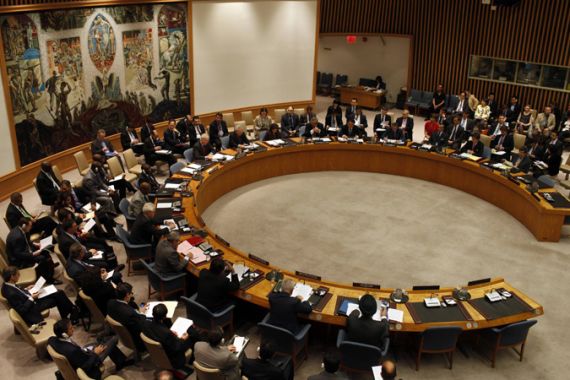UN Security Council backs Syria peace plan
Group unanimously adopts statement calling on government to abide by six-point UN-Arab proposal or face “further steps”.

The United Nations Security Council has adopted a statement backing joint UN-Arab League envoy Kofi Annan’s plan for ending the year-long violence in Syria, as a government crackdown on opposition strongholds has continued.
The statement, adopted on Wednesday, expressed the council’s “full support” for Annan’s efforts, and called upon both the government and the opposition “to work in good faith with the envoy towards a peaceful settlement of the Syrian crisis” and to fully implement his six-point proposal.
The statement threatened “further steps” if the government failed to comply with the proposal.
UN Secretary-General Ban Ki-moon said the council had sent a clear message to Syria to end all violence, which has claimed more than 8,000 lives, and for a dialogue to start between the country’s government and the opposition.
“In clear and unmistakable terms, the Security Council called for an immediate end to all violence and human rights violations,” Ban said. “It demanded secure humanitarian access and a comprehensive political dialogue between the government and the whole spectrum of the Syrian opposition.”
Hillary Clinton, the US secretary of state, termed the adoption of the statement “a positive step”, and urged Assad’s government to “take this path, commit to it, or face increasing pressure and isolation”.
But the Syrian National Council, Syria’s main opposition group, said the UN statement will simply give the government more time to continue killing its own people.
“Such statements, issued amid continued killings, offer the regime the opportunity to push ahead with its repression in order to crush the revolt by the Syrian people,” said Samir Nashar, a member of the council’s executive committee.
‘Humanitarian pause’
Anan’s plan calls for a ceasefire, specifically a “daily two-hour humanitarian pause,” to be established, as well as for both sides to engage in political dialogue and to allow humanitarian aid agencies access to areas where citizens have been caught up in an increasingly militarised conflict.
It also calls for those detained during a government crackdown on protests to be released, and for restrictions on the freedom of movement of foreign journalists to be removed.
The 15-member council, including China and Russia who have vetoed previous moves, called on the Syrian government to commit to working with “an inclusive Syrian-led political process to address the legitimate aspirations and concerns of the Syrian people”.
In an interview with Al Jazeera, Sharif Shehadeh, a pro-government writer, said: “What is meant by halting violence involves, in my view, the need for [opposition] gunmen to hand over their arms to the Syrian government because in all parts of the world, there is only one legitimate authority.”
“If there are others who carry arms we can only call them armed gangs or armed groups,” Shehadeh said. “The only party that should look after and safeguard human rights is the Syrian government.”
Unlike resolutions, which are legally binding, statements are generally non-binding but require unanimous support from the council.
In a bid to gain support from Russia and China, France softened the text of the statement, removing a section that would have required a review of progress on Annan’s proposal in seven days. The government would have been threatened with “further measures” if sufficient progress was not deemed to have been made.
Full support
Speaking in Berlin, Sergei Lavrov, the Russian foreign minister, said that the text of the statement “reflects the reality in Syria and supports Annan’s aims. We support it fully”.
“The document does not contain any ultimatums, threats or assertions about who is guilty,” he said,
Earlier, Lavrov told radio station Kommersant-FM that Russia believed that “the Syrian leadership reacted wrongly to the first appearance of peaceful protests and … is making very many mistakes”.
“This, unfortunately, has in many ways led the conflict to reach such a severe stage.”
Lavrov also spoke of a “future transition” period for Syria but continued to reject calls from most Western and Arab states for Assad to resign, saying this was “unrealistic”.
One of the major sticking points over a resolution on the crisis has been on the issue of how a ceasefire is to be implemented. While previous resolutions have called for the government’s forces to stop firing first, Russia and China have insisted that both the government and opposition must lay down arms simultaneously.
The current statement calls on the Syrian government to “immediately cease troop movements towards, and end the use of heavy weapons in, population centres, and begin pullback of military concentrations in and around population centres”.
“Similar commitments would be sought by the envoy from the opposition and all relevant elements to stop the fighting” it said.